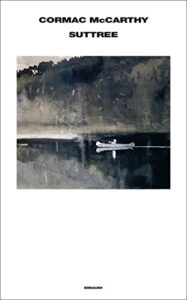 The Opus Magnum of McCarthy, Suttree, is a beautiful and terrible book at the same time, a poverty epic, of the irredictable poverty of the poor reduced to Archetypes of humanity, whose unique comfort consists of oblivion and alcohol, in a city scenario reduced to cloaca, degradation, greed, violence.
The Opus Magnum of McCarthy, Suttree, is a beautiful and terrible book at the same time, a poverty epic, of the irredictable poverty of the poor reduced to Archetypes of humanity, whose unique comfort consists of oblivion and alcohol, in a city scenario reduced to cloaca, degradation, greed, violence.
Sut the protagonist is not as poor as birth, though, he chose poverty to escape from the hypocrisy of his environment, he lives in a floating cabin along a river unclaimed of sewage, toxic waste, factory discharges, has a rowing boat ‘disgusting ‘ with which he keeps fishing in the putrid waters of the river, catish fish, aguglie.
Obviously primarily the reprobate by definition, Cornelius Suttree, the one who abandoned his power clan, which gave up all the privileges of his belonging class, who declined love, devote himself to a fisherman’s life, having as friends the worst of the local community, thieves, airlibrators, prostitutes, barriers, sweepers, guess, drunk and imbeciles.
Suttree is a dated book dating back to 1979, reed by Einaudi in 2014, I repeat the literary masterpiece of Cormac McCarthy, for the literary idiom used in the narration conducted in a feat of accurate and effective reinvention of the stream of consciousness, with which it describes the existence grama and useless, violent, desperate of hordes of poor and unemployed, white and black hordes, all confluents on the degraded shores of the Tennessee river, often to awkward at the Sut veranda, around the year 1950.
Everything is intended irreparably towards the disaster or towards obsolescence, the body, the river, the floating house, the fish immersed by indiscriminate pollution. But also social relations, those friendly, those dictated by love. Nothing escapes this corrosion. You will say McCarthy: “Death is the only mathematical certainty, death is how life grants everyone” The Lives Around Him Are “Running Out Like Something Foul, Night Soil from to Cesmpipe, at Measured Dripping in the Dark”. The same Sun is nothing but a yellow hole lit behind hell.
Every vital form is granted to the reader in its inexplicitability, which are vertebrates or invertebrates, territory and nature, the same word that can be opened to the right to residual faculty, ie an immense pity for man, for nature, for the starry sky. A poignant masterpiece, I said, a caposaldo book of the twentieth century.
